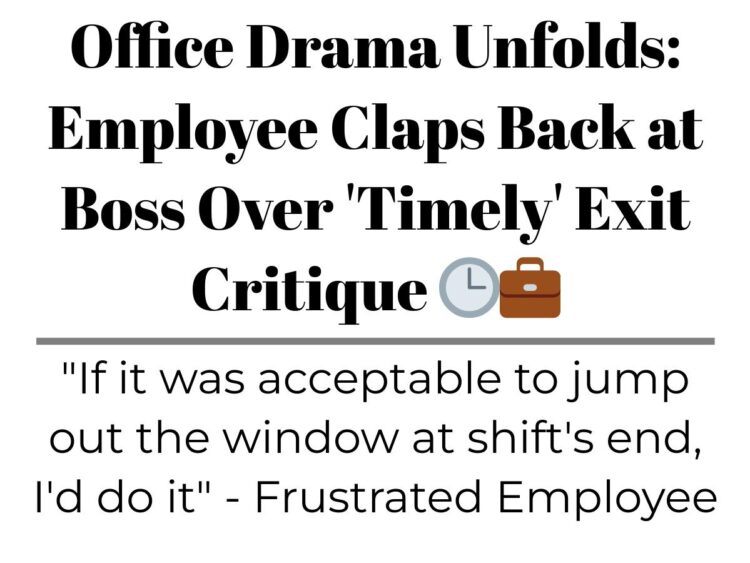Imagine being in a job that’s just a stepping stone to something better. You show up, do your work, and count the minutes until you can make your great escape. That’s the daily grind for one employee, who recently faced an unexpected critique during a performance review. This isn’t just any office tale; it’s a saga of timekeeping, personal boundaries, and the age-old question: Is it really so wrong to want to leave work on time? Dive into the drama that unfolded when one worker stood up to their boss’s peculiar complaint.
Performance Review Surprise

The Daily Grind

Praise Turns to Puzzlement

The ‘Eager’ Accusation ♂️⏱

A Window of Opportunity?

Eyebrows Raised

The Timely Defense ⚖️

HR’s Timeclock Tactics ⏲️

The 8-Hour Itch

A Sea of Compliments

Respectful, Yet Unthrilled ✊

Unspoken Expectations?

Flabbergasted and Warped

The Work Ethic Conundrum ️❓

The Joy of Clocking Out ⏰

Defending the Right to Depart ️ ♂️

The Great Escape: Is Wanting to Leave on Time a Crime? ⏳
In a world where the 9-to-5 grind can sometimes feel like a life sentence, one employee’s quest for timely freedom has sparked a heated debate. Is it a cardinal sin to watch the clock, counting down the seconds to liberation? This office warrior thought not, especially after a day of digital drudgery. But when their boss flagged their punctual punch-out as a problem, it was time for a showdown. With a blend of sass and sincerity, they defended their right to reclaim their time. And as the dust settles on this workplace wrangle, we’re left to ponder: since when did ‘leaving on time’ become the new ‘leaving early’? Now, let’s take a peek at what the internet has to say about this clock-watching controversy.
Leaving on time may hint at job dissatisfaction, affecting promotions
due to lack of commitment.

Debate over work ethic: NTA vs NAH, global perspectives clash
t

Navigating workplace politics: concealing disdain and decoding non-direct feedback
toxic work culture and the art of subtle communication.
take control
to thrive in any job.
take control
to thrive in any job.
NTA for valuing life outside work
to thrive in any job.

Unpaid overtime and bad attitude? Dystopian work culture at play
today.

Leaving on time = family, fun, and self-care priorities
to the commenter’s boss: read between the lines
to the replier: constructive criticism or subtle undermining?

Employee feels judged for leaving on time, struggles with enthusiasm
during menial tasks
to be engaging.

Challenging the ‘salaryman’ mindset . Demonstrating productivity beyond clocked hours.

HR-lady defends leaving at 4:31pm, emphasizes work/life balance
to boss
to boss

Standing up for fair work hours . Contracted hours matter.

Standing up for fair treatment at work
time to address office politics
toxic work culture
take a stand

Respect your time
You’re more than just your labor
Stand firm
⏰

Sticking to my hours and leaving on time
didn’t make me popular
guess I’m a bad team player
disappointing
to some coworkers
disappointing

Navigating work culture: politeness vs. paycheck
![Image credit: [deleted] | [deleted]](https://static.diply.com/831e4079-506e-4c59-a99b-69db71b93057.png)
Navigating hourly work and performance reviews: employee’s thorough explanation

Understanding ‘end of the day’ 101: Not the a**hole vibes

Boss’s ridiculous demand for flaw in perfect employee backfires

Constructive feedback on enthusiasm without docking points
to appear more committed
to the job
to the boss
to the team
to the future
to success
to excellence
to a brighter career
to you
to NAH
to growth
to understanding
to improvement
to success
to a positive workplace
to feedback
to progress

Standing up for work-life balance Boss needs a reality check

Balancing honesty and professionalism at work can be tricky
don’t shoot yourself in the foot
don’t burn bridges
don’t make it obvious you hate your job
don’t disengage

Standing up for punctuality and work-life balance
toxic work environment
time to find a new job
time’s up
dictating passions
disgruntled employee

Standing up for work-life balance
Setting boundaries with bosses


















































